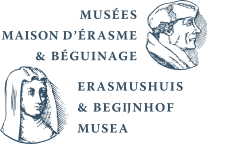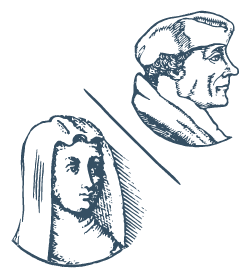Who are we ?
The Erasmus House and Beguinage
Inaugurated in 1930 and 1932 respectively, the Beguinage and the Erasmus House are located in period buildings now listed as historical monuments and figure among the pearls of Brussels cultural architecture.
The Erasmus House is an historic residence where Erasmus, the illustrious humanist of the Renaissance, stayed for several months in 1521 and hence made famous. Converted into a museum, it is a showcase to him and his era. The museum features the intellectual universe of the Renaissance through Erasmus’s extensive literary and complex works, still astonishingly modern, which are presented in a recreated setting, enhanced by Gothic and Renaissance furniture. In addition, the various rooms house a collection of paintings and engravings by masters of the XVth, XVIth and XVIIth centuries. On display are also several portraits of Erasmus and sculptures which testify to the consummate skill of the artists of the Southern Netherlands
The Beguinage is a reflection of a religious movement founded in the XIIth century and firmly rooted in this part of the world, namely the beguines, lay sisters who lived in their own communities. Today it also houses a folklore museum containing various recreated rooms showing how life was lived before, and at the beginning of, the industrial revolution. The exhibits also evoke the lives and activities of the beguines.
The beguinage buildings, certain sections of which date from the XVth century, have been the focus of various archaeological studies, such as an analysis of the construction and a survey of its wooden framework. The beguinage will undergo renovation work in 2021. A new museum project is under consideration.
In addition to the collections on display, our institution also possesses extensive archives, iconographic documents and assorted objects associated with the history of the commune and the collegiate church of Saints Peter and Guidon, which date from 1078 to the modern day.
We place considerable emphasis on conservation and restoration. Various studies and laboratory analyses have been undertaken with the assistance of IRPA (the Royal Institute for Cultural Heritage).
The collections are enhanced thanks to our mediation tools (visitor’s guide, circuits for families, audio terminals, etc.) A multi-lingual team of guides provides groups with guided tours.
In addition to our permanent exhibition, we also pursue a policy of temporary exhibitions. Historical and literary themes alternate with exhibitions of contemporary art.
In the year 2000, when Brussels was the European Capital of Culture, the garden was re-conceptualised with the aim of giving it both a permanent and contemporary flavour. This so-called « philosophical garden » proposes a dialogue with the thought and writings of Erasmus, as seen through the creations of contemporary artists of international renown, such as Bob Verschueren or Marie-Jo Fontaine.
Today we continue to showcase contemporary art and those artists whose approach is associated with, makes reference to or addresses the history of the Middle Ages or the Renaissance. Our intention is to make pertinent links between the past and the present so that the past continues to find an echo in the present.
Drawn up with the aim of retaining and attracting a variety of visitors, our cultural programme is multi-dimensional: conferences, concerts, varied courses and workshops. A Latin course, held throughout the year, provides an initiation into reading authors of Antiquity, the Middle Ages and the Renaissance in their original language.
Special emphasis is placed on marginalised audiences, by working in tandem with local organisers rooted in the voluntary sector.
We are committed to ensuring our museums remain relevant to school audiences, thanks to specially adapted programming. Individual visits and guided tours, displays of objects and various workshops are designed to meet the needs of different school audiences. Workshops devoted to medicinal plants are organised with the Centre National d’Histoire des Sciences.
In conclusion, we continue to pursue an active policy of scientific partnerships, through links with exhibition curators, book loans, publications and conferences.



